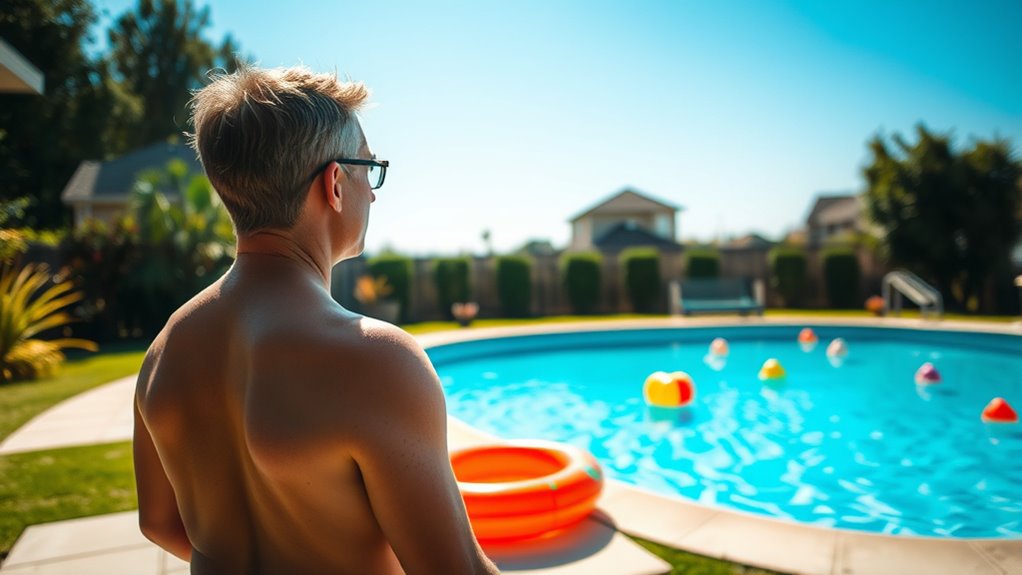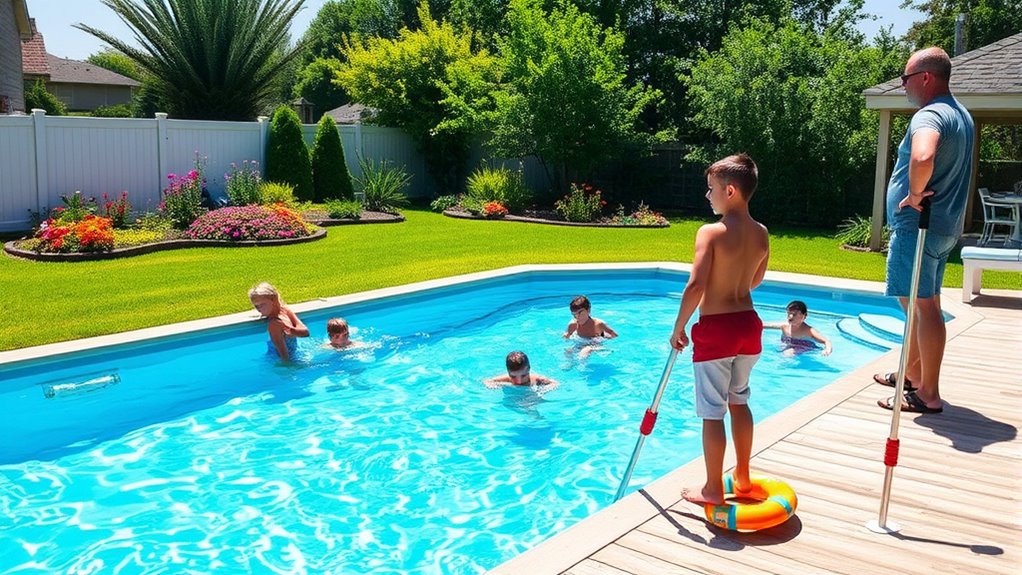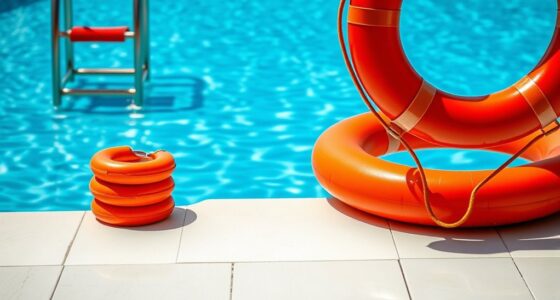Without a lifeguard at home, you need to stay extra vigilant to keep everyone safe. Always supervise children closely, avoiding distractions like phones or conversations. Establish clear pool rules such as no running or diving, and use a sturdy fence with a self-latching gate to restrict access. Keep emergency devices nearby, learn CPR, and regularly inspect the area for hazards. Following these tips helps you supervise like a pro—stay tuned to discover even more effective safety strategies.
Key Takeaways
- Always assign a responsible adult to supervise the pool actively, avoiding distractions like phones or conversations.
- Install a secure fence with a self-latching gate to restrict unauthorized access and prevent unsupervised entry.
- Establish and enforce clear pool rules, such as no running or pushing, and communicate them before swimming.
- Keep safety equipment nearby, like life rings and reaching poles, and ensure emergency contact devices are accessible.
- Regularly inspect the pool area for hazards, maintain safety protocols, and practice emergency procedures, including CPR.

Ever wonder how to guarantee everyone stays safe around the pool? Even without a lifeguard on duty, you’re responsible for creating a safe environment. The key is strict water safety measures and vigilant child supervision. When you’re supervising your pool, it’s essential to stay attentive at all times. Distractions can turn dangerous quickly, so avoid using your phone or engaging in other activities that take your focus away from the water. Always keep an eye on children, no matter how shallow the water seems or how well they can swim. Children can get into trouble in seconds, so constant supervision isn’t optional—it’s a necessity.
Constant supervision is essential; stay attentive and avoid distractions to keep children safe around the pool.
Establish clear rules about pool use before anyone enters the water. Make sure everyone knows not to run, push, or plunge in shallow areas. Limit access to the pool by using a sturdy fence with a self-latching gate to prevent unsupervised entry. When children are around, designate a responsible adult to be the designated supervisor. Remember, supervision isn’t just about being present; it’s about actively watching. Sitting nearby is good, but you should be paying close attention, not distracted by conversations or devices. If you need to step away, have another adult take over supervision.
It’s also wise to invest in appropriate safety equipment, like life rings or reaching poles, easily accessible in case of emergencies. Keep a phone close by for quick emergency contact, and learn CPR. That way, if an incident occurs, you’re prepared to act immediately. Never rely solely on floaties or toys for safety, as they aren’t substitutes for vigilant supervision. These are fun accessories, but they shouldn’t replace careful watching.
To further enhance water safety, teach children basic pool rules and the importance of staying within sight. Encourage them to wear proper swim gear, and make sure their swimming skills match the pool environment. If you notice any signs of distress or unsafe behavior, intervene promptly. Never assume someone else will watch out for trouble; you’re the frontline of defense. Regularly inspect the pool area for hazards like debris, slippery surfaces, or broken equipment that could cause accidents. Being aware of toilet flushing mechanisms and how they work can also help prevent plumbing issues that might lead to water hazards or costly repairs.
Frequently Asked Questions
What Are the Legal Requirements for Pool Supervision?
You need to follow local laws for pool supervision, which often include having a responsible adult present and ensuring safety measures like pool fencing. Check if liability insurance is required to protect against accidents. It’s essential to keep children supervised at all times, especially when no lifeguard is on duty. Proper fencing and continuous supervision reduce risks and help you meet legal requirements, keeping everyone safe and compliant.
How Can I Train Children to Be Water-Safe?
You can train children to be water-safe by prioritizing water safety education and swimming skill development. Start early by teaching them basic water safety rules, like never swimming alone and recognizing dangers. Enroll them in swimming lessons to improve their skills and confidence. Practice regularly with them so they become comfortable in the water. Reinforce safety tips consistently to help them understand the importance of staying safe around pools and open water.
What Safety Equipment Should I Have on Hand?
Your pool safety kit is your fortress against accidents, more crucial than a superhero’s shield. Keep a reliable pool alarm to alert you instantly of any unauthorized access. Have rescue equipment like a life ring, reaching pole, and first aid kit nearby. These tools guarantee you’re prepared to act swiftly if a situation arises, helping you protect your loved ones and prevent tragedy. Being ready makes all the difference.
How Do I Handle Emergencies if No Lifeguard Is Present?
When no lifeguard is present, you need to be prepared for emergencies by knowing rescue techniques and maintaining clear emergency communication. Stay calm, assess the situation quickly, and call for help immediately. Use rescue equipment like a reaching pole or life hook if needed. You should also have a phone nearby to call emergency services. Practicing rescue drills regularly helps you respond confidently and effectively during real emergencies.
Are There Specific Supervision Guidelines for Different Age Groups?
Imagine guiding your little explorers safely through their aquatic adventures. For child supervision, stay within arm’s reach and keep constant eye contact to prevent accidents. Teens, on the other hand, benefit from open conversations about responsible swimming and peer safety. Tailoring supervision to each age group’s needs helps you create a secure environment, ensuring everyone enjoys the water safely while you stay confident and in control.
Conclusion
So, no lifeguard at home? No problem! Just keep an eye on that pool like a hawk on a mouse, never let kids out of your sight, and remember: distractions are your enemy. Who needs a professional when you’ve got your own superhero instincts? Stay vigilant, stay safe, and turn that backyard splash zone into a fortress of fun—minus the aquatic disasters. After all, a vigilant you beats a lifeguard any day!










